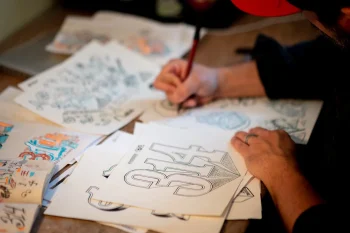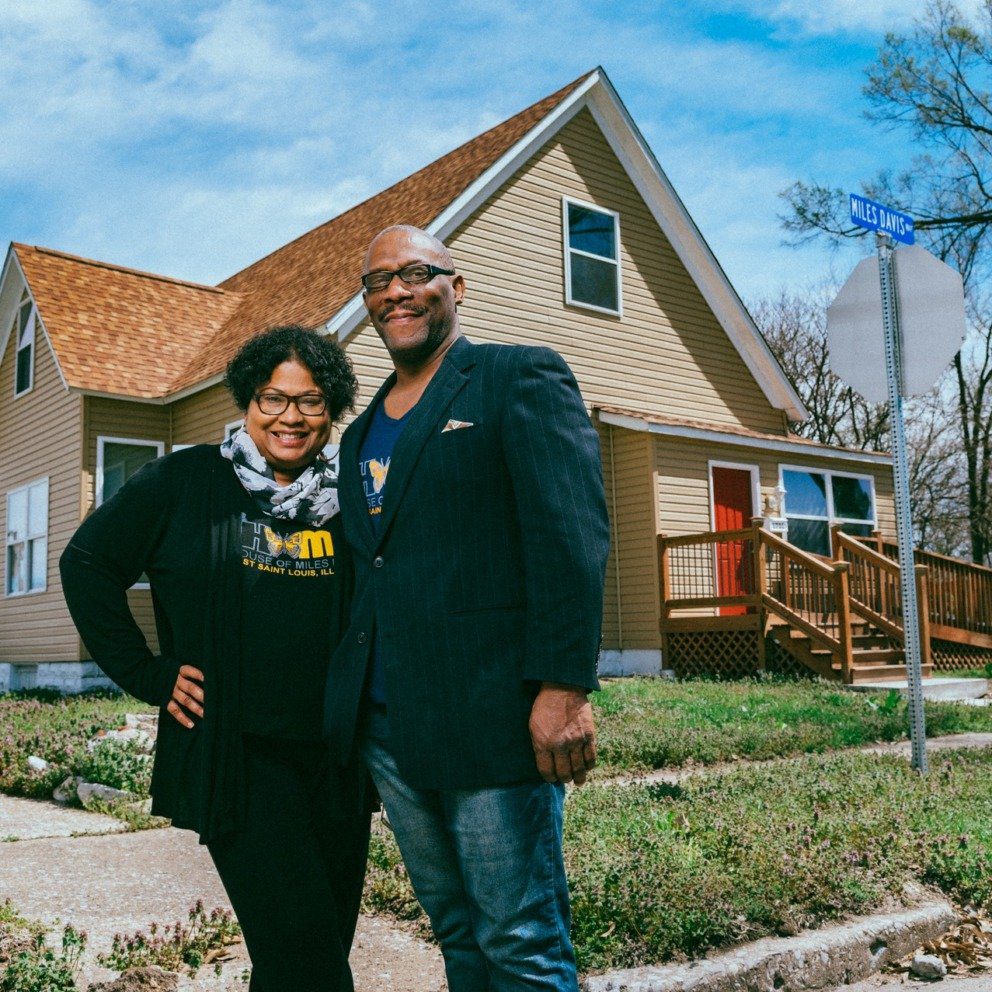Notes of Community
Soul artist turned community facilitator Brian Owens helps lift up young creatives in St. Louis.
For Brian Owens, creating art is just as essential as building a community to sustain it. The Belleville-bred, St. Louis-based soul artist and entrepreneur is dedicated to cultivating the next generation of artists. This year, he partnered with the World Chess Hall of Fame to curate music events on the campus in hopes of making it a premier destination for creatives in the city. Through the Life Creative Ecosystem that Owens founded in 2016, he has provided leadership opportunities for youth interested in pursuing a career in the arts. And, with its for-profit arm, Life Creative Group, Owens creates an opportunity for young creatives to build equity with their work.
“Ten years ago, if you would’ve asked me what I did, I would’ve said I’m an American soul artist. But the more I got into facilitating community development through music and the arts and film, it started to shift,” says Owens. “I mean, I could come up with all these cute little ways of putting words to together, like ‘I’m a creatorpreneur,’ or, ‘I’m an artrepreneur,’ but I think I’m just like a facilitator. That’s really what I do, I facilitate. And I tell people that I facilitate nouns: People, places and things.”
As the host and ambassador for September’s Music at the Intersection, Owens is continuing that work as a facilitator, helping to show how St. Louis can be a national hub for music and entertainment. The festival’s presence in the city anchors that vision.
The two-day event begins Sept. 10 in the Grand Center Arts District, and includes performers Erykah Badu, Robert Glasper, Gary Clark Jr., the St. Lunatics and Ferguson-bred trumpeter Keyon Harrold (who also serves as creative advisor to Jazz St. Louis). Formed last year, Music at the Intersection is designed to celebrate the rich history of St. Louis’ local music scene while also highlighting mainstream acts. Owens said he was initially asked to be a performer at the festival before he became a host of it.
“I’m realizing my relationship to the city is changing,” says Owens, who lives in Ferguson. “I think people who know me know what I do, and you can go on YouTube and see what I do. But I think now, as I get a little bit older, I’m turning into more of the ambassador for the city. I want to be a spokesperson for the creative space, not only globally, but just within St. Louis, to businesses and institutions and community to say, ‘Here’s what we have to offer. Here’s what we stand on. We’re not just the stepchildren of other music cities. We’ve put out some pretty important people from this region.’”
Owens’ intimate relationship with the city and its music started across the river as he was raised in Cahokia (now Cahokia Heights), Illinois before moving to Belleville at the age of 10. Under the direction of his father, Owens grew up singing in the choir at Centreville Church of Christ—formal training that still stays with him. Owens remembers regularly singing the hymn “Hard Fighting Soldier.” The music of the legendary “King of Soul” Sam Cooke, another artist who grew up singing in the church, also shaped Owens’ relationship with music. Owens has performed several times with Cooke’s daughter, Carla.
“Gospel was, is and always will be the foundation for me, like most soul singers. You’d be hard pressed to find one where that isn’t the case. It’s also just a part of my faith—being still very much active in my faith and my church life. That music still is something that is important to me, it’s important to my family and it’ll be passed down to future generations.”
He said the style of music helped him to emotionally interpret songs for audiences, but he clarifies that the music heard in his home wasn’t limited to genre. It was about the quality of what was being played.
“My dad sang in small groups, my brother sang in groups, so music was something that was always there in our house,” Owens said. “And it was a variety of music. Whether it was old gospel or The Monkeys, or I remember my brothers went through this whole phase in the ’80s, because they’re like six or seven years older than me, where they would listen to all the new hip hop, like Run DMC and De La Soul, to James Taylor, so we had this very diverse kind of offering of music in our house, because it wasn’t relegated to genre. It was relegated to substance.”
It’s a standard that created Owens’ extensive career in creating lush soul ballads that make you feel exactly what he’s singing. Owens’ career as a solo artist spans more than five albums and includes a Grammy nomination. His most popular single is a cover of Sam Cooke’s consummate 1964 hit “A Change Is Gonna Come,” which he performed with his dad, Thomas.
The single shines for the duo mimicking the gospel-tinged retro flair that makes the original recording so spellbinding. Understanding Owens’ experiences while growing up in a predominantly white Belleville during the 1980s makes the lyrics of the single even more piercing. Owens recalls a time when he was racially taunted in middle school and responded with an angry outburst, prompting the school to call his father. Though his father eventually came to the school, he wasn’t interested in disciplining his son. He was more interested in understanding why the person who prompted his son to be outraged was acting that way.
Owens describes the encounter as one of the most powerful experiences that has informed the way he interacts with people.
“What my father was saying was, that boy wasn’t born that way,” Owens recalls. “Whatever was coming out of him was put in him, and so my father’s concern was not necessarily what’s coming out of him, but what’s being put in him. He wasn’t concerned about Brian, because Brian is in an environment where what’s being put in him helps him sustain this stuff. Does that young boy have the same? If not, how can we help him?”
Responding to a racist act with empathy for the aggressor is a rosy approach for tackling a systemic issue, but Owens is a firm believer in being able to help anyone. He applies that practice to his work with youth in the community.
Through his residency at the World Chess Hall of Fame, he aims to develop a new initiative that will provide young creatives on the campus with the resources to build a fierce, collaborative community for artists. And this summer, Owens partnered with production company The Butler Group to offer a film camp for youth. If that wasn’t already a busy list, he plans to launch a creative media accelerator program in the fall with UMSL Accelerate.
But each aspect of Owens’ work is intentional.
“It’s like, okay, I’m the artist-in-residence here, and I’ll oversee the music series,” says Owens. “The next move is that I want to be able to now take my young creatives that I’ve been developing over the last two to three years, and position them to be curators for their generation…to have a writer’s round that’s akin to what you would see in Nashville at The Bluebird Cafe, but have it in the backside of Kingside Diner. To have writing retreats where we bring in up and coming larger writers from other cities to take part in and help mentor and help develop the younger writers in this city. And to also allow them, individually, to come into their own in their respective disciplines.”
Owens feels called to lift up the next generation because of all the people who have believed in him.
“I feel very blessed and fortunate that God has given me a lot of favor with people,” he says. “Dave Steward (founder of WWT) is a mentor, and the level of knowledge and wisdom that he has, and can pour into my life, but also the opportunities that he can pour into my life that allows me to have proof of concept with things. Folks like that. So that’s what allows me to be able to not only build these relationships that are necessary, but also have the right and proper perspective.
“It doesn’t happen overnight, and as much as it takes resources, it takes relationship.”
The relationships that Owens has built are evident through the number of partners he’s connected with in both the for-profit and nonprofit worlds. From the aforementioned University of Missouri–St. Louis and World Chess Hall of Fame, to Beyond Housing, M1 Bank and Maryville University, Owens has woven a web of connections throughout the region that support his vision for St. Louis — a thriving city where the arts are indicative of its success and forms a mold for the rest of the world to follow.
“There’s so many stories here that, if told, could change, I believe, not only just the world’s view of our city, but our view of our city,” says Owens. “There’s so much that goes untold and people get stuck on what they see in the news, or what’s been reported in the sizzle reels that come from Ferguson. And I think our city, with all of its flaws and blemishes, and there are many, but most cities have a lot of flaws and blemishes.”
“I think what makes St. Louis special and unique, is that we do have people right now on the ground who are dedicated to consistently and strategically figuring out and working out what the next 20 years can look like for the next generation.”
Owens sees supporting and investing in young creatives in St. Louis as the key to making that vision a reality.
“We just have to continue to evangelize those who want to do something, but don’t know what to do, and say, ‘One of the best investments you can make is into the creative space and these young creatives in this city, and to telling and remapping the story of St. Louis to be, I believe, true to what we really are.'”
Join the Story
- Purchase tickets to Music at the Intersection.
- Check out the upcoming events in the World Chess Hall of Fame’s music series.
- Learn more about Brian by listening to this July 2020 episode of “St. Louis On The Air” from St. Louis Public Radio.







